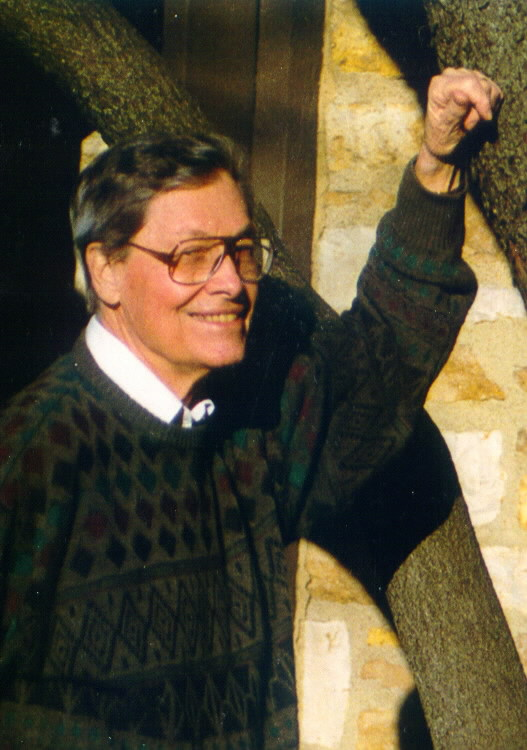





1. What single characteristic do you possess which is most responsible for your success as an SF writer? I'm not sure one can reduce this to a single characteristic. An imaginative turn of mind is essential, a love of and skill with words, a sense for story, a determination to succeed and an unwillingness to accept failure, a familiarity with literature, an ability to keep learning--and, finally, and perhaps the most important, an understanding of self and the ability to put that unique view into fiction. 2. Which authors do you most admire (not necessarily in the SF genre) or have influenced your writing or thinking? I've had a number of literary heroes: Thomas Wolfe and Ernest Hemingway In the general literary field, Thomas Costain, Kenneth Roberts, and Neil Swanson among historical novelists, H. G. Wells in the early SF period And Isaac Asimov, Robert Heinlein, A. E. van Vogt, Clifford Simak, and Theodore Sturgeon among authors of the Golden Age, many others later. 3. Do you think that SF writers need some form of expertise to write successfully? See #1. Certainly a feeling for words and story, and an thorough understanding and familiarity with the genre in which one chooses to write. 4. Despite the current vogue for SF movies and TVseries, literature in the genre is not takenseriously. Do you agree with this statement and if so,what do you think is the reason for this? SF is taken more seriously than it was 50 or even 25 years ago, partly because the pulp magazines no longer are identified with it (not altogether a good thing) and more can be found in books of all description. Nevertheless most SF is not valued as serious literature because it is Darwinistic (see my essay, "The World View of Science Fiction" on the Center website)--concerned with change and the effect of change on people—and so-called "serious" fiction deals with the fixed past and the ways in which character interacts with it. When mainstream writers use SF themes (and critics and scholars consider it "serious" literature) it is because the SF concept is used metaphorically rather than as a possible change in human response. 5. Where is SF heading now that technology is usually one step ahead of imagination? I don't think the statement is true; imagination always outdistances technology, even though technology sometimes surprises us. However, I see SF heading more into the biological sciences in the decade or two ahead. 6. How important is teaching SF in the States? The Golden Age for teaching SF was the late 1960s and early 1970s, when SF was just getting introduced into classrooms and still had a Revolutionary reputation. Today it is more accepted and less raffish, and I have the feeling that the number of classes has declined a bit, particularly with the back-to-basics movement in high schools. There may be a resurgence beginning. 7. What is the place of SF in American literature? A minor but perhaps growing place as SF is recognized as being Peculiarly American and peculiarly congenial to the American view of life--that is, the future is more important than the past. 8. What are you working on now? I'm revising the six-volume THE ROAD TO SCIENCE FICTION anthologies for republication by Scarecrow Press; I'm also considering a revised edition of ALTERNATE WORLDS: THE ILLUSTRATED HISTORY OF SCIENCE FICTION; and I'm on the fifth novelette in a series I'm doing for ANALOG called GIFT FROM THE STARS, that I hope to publish as a novel when it is completed. 9. Are you familiar with the work of Romanian SF writers? Only those with whom I came into contact when I visited Romania a decade ago and those I included in THE ROAD TO SCIENCE FICTION #6. 10. What advice would you give to a writer starting out in the profession? Do it in your spare time until you are sure you can make a living at it. Learn all you can about science, particularly the most speculative varieties, the cutting edges. Write regularly and don't give yourself any excuses for not writing; rewrite; keep trying to publish what you have written; don't be easily discouraged but don't expect immediate rewards; keep trying to improve; never be satisfied.
|
respiro@2000-2004
All rights reserved
